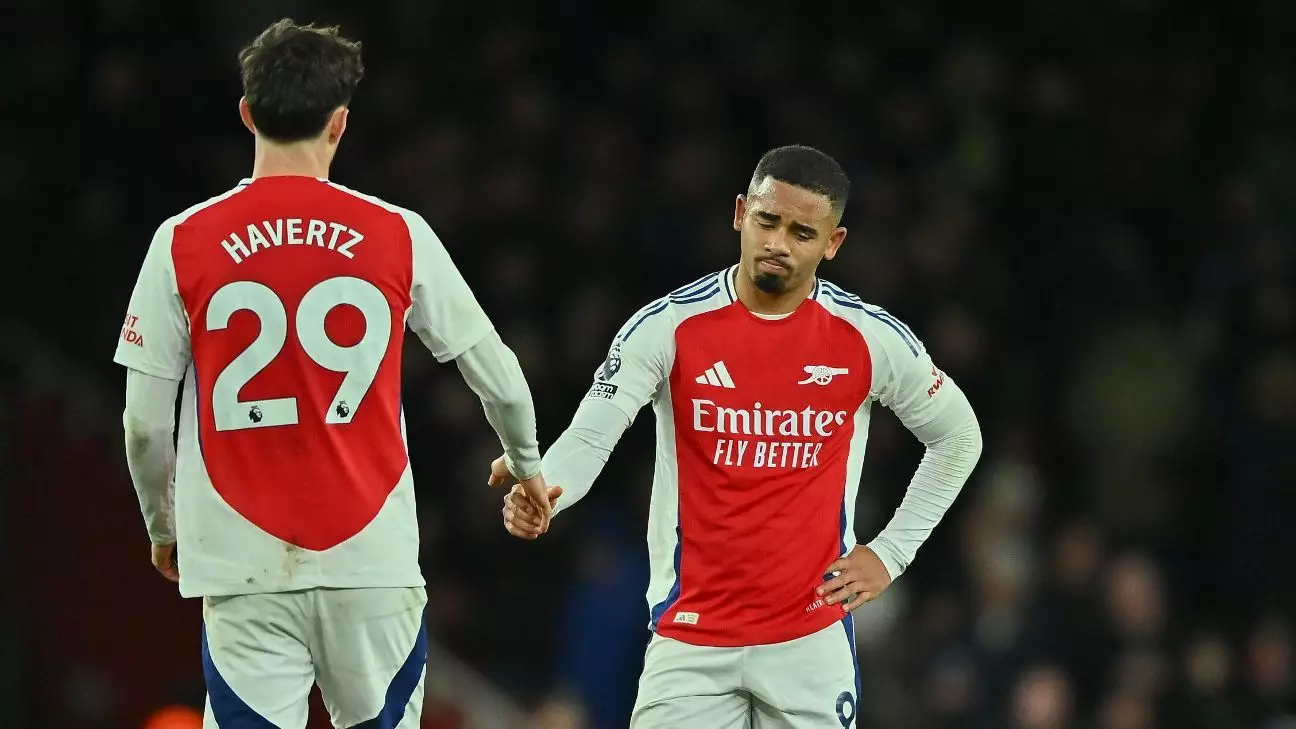Arsenal’s 0-0 stalemate against Everton on Saturday has reignited troubling conversations surrounding the club’s ambition and strategic decisions, particularly concerning the upcoming January transfer window. After witnessing an impressive start to the season, where promising talents like Martin Ødegaard and Bukayo Saka illuminated the pitch, frustration is palpable among fans and analysts alike. Despite Arsenal’s creativity and recent successes, this deadlock spotlighted a notable deficiency in the squad’s depth, particularly when faced with teams determined to defend resolutely.
Amidst growing expectations, Arsenal’s management seems reluctant to substantially invest in the January transfer market, prioritizing existing squad capabilities over new acquisitions. Other clubs, notably Manchester City, have shown their intent to support their managers with funds to improve their squads. In contrast, Arsenal’s hierarchy appears stoically committed to their current roster, suggesting that any movement in the market would only occur in response to injuries or unexpected opportunities. Many fans and analysts are now questioning whether such an approach aligns with the club’s ambitious aspirations.
Head coach Mikel Arteta frequently emphasizes the potential for players already within the squad to grow and develop. However, the recent match against Everton revealed that while there are promising talents, their ability to change a game’s momentum—especially against defensively organized opponents—remains uncertain. Ødegaard and Saka have proven to be instrumental assets, contributing to a potent offensive strategy enriched by set-piece ingenuity. Yet, on occasions where creativity stalls, such as against Everton, the reliance on their brilliance alone becomes a glaring weakness.
Even as Arsenal’s established stars display moments of brilliance, the absence of game-changers on the bench adds an unsettling layer of risk. The substitutions made by Arteta, particularly withdrawing Ødegaard and Declan Rice, have raised eyebrows and pointed to an apparent miscalculation. While intended to refresh the side’s attacking approach, the decision to replace the team’s creative linchpin seemed more like a leap of faith than a tactical masterstroke. When a manager opts to substitute a player of Ødegaard’s caliber in pivotal moments, it poses significant questions about the adequacy of the alternatives on the bench.
The aftermath of Arteta’s tactical decisions was disjointed gameplay that lacked cohesion and clarity. Newly introduced players like Kai Havertz and Ethan Nwaneri failed to make substantial contributions, indicating a disconnect between expectation and execution. Despite their potential, it was a moment that exposed the club’s shortcomings in depth, as the substitutes struggled to impact the game positively. Notably, the performance of players like Gabriel Jesus, who has not found the back of the net in his last 23 league appearances, adds to the growing concern regarding the attacking options available to the team.
Moreover, the inclusion of Raheem Sterling, who had been brought in on loan, raised eyebrows. He remained an unused substitute in a match where Arsenal desperately needed a creative spark. The contrast between Sterling’s skill set and the team’s requirement for versatility prompts reflection on the wisdom of such acquisitions. With each disheartening result like this, the potential disparity between an active transfer market and the club’s current strategy grows starker.
Despite having boasted the highest scoring tally in their Premier League history last season, the reality is that the quality of performances has fluctuated considerably thus far. Arteta himself acknowledged that while the team has had its moments, they continue to lack the “spark” needed to convert potential into goals. The manager’s defense of his players speaks volume about his belief in their capability, yet there is a growing consensus that the current squad needs more than faith to consistently challenge for titles.
As Arsenal fans reflect on this season’s disappointments, the urgency for new signings grows more pressing. If the current trend of lackluster performances persists, the club may find it incumbent to venture into the transfer market, seeking reinforcements that can elevate the team’s prospects and fulfill the lofty ambitions that have characterized Arsenal’s history. The blend of youthful talent and seasoned experience may yet yield results, but adjustments might be necessary in achieving the ultimate goal of Premier League glory.

Leave a Reply